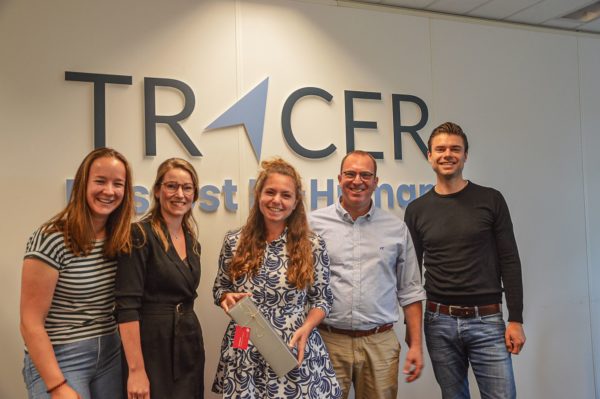The four finalists of the 'LIFE Science Innovation Award' have been announced. On Tuesday, Sept. 27, 2022, Sulfateq, Detact Diagnostics, ICON and TRACER may pitch their submitted innovation at the LIFE Science Conference. From more than 20 applications and nominations, the board has selected the four finalists. The LIFE Science Conference and Innovation Award are made possible in part by NV NOM, Municipality of Groningen, Campus Groningen and the LIFE Cooperative.
A nice mix
The Innovation Award is presented to the innovation with the most impact in the field of Life Sciences & Health, with an origin in the Northern Netherlands. The winner wins a check for €5,000 euros. Chairman Ton Vries of LIFE Cooperative is very pleased with the entries, "We received entries from all kinds of disciplines and angles in the Life Sciences & Health sector. This also results in a nice mix of the four companies and innovations that advance to the finals." During the finals on Sept. 27, the jury will be represented by individuals from the Municipality of Groningen, the NOM and Pharma Connect Capital, among others. Registration for the event is still open until September 1 via www.lifecooperative.nl
About the finalists
From about 20 applications, the innovations of Detact Diagnostics, TRACER, ICON and Sulfateq were chosen to pitch.
Sulfateq
Sulfateq BV is an innovative biotechnology company developing breakthrough compounds to treat a wide range of conditions. Currently, there is no working drug that counteracts Alzheimer's progression, such as memory loss. For a potential treatment, Sulfateq has discovered a compound based on nature: hibernation. Hibernators contain protective mechanisms that can prevent or even repair organ damage during hibernation, for example. In collaboration with GEN İlaç, a leading pharmaceutical company in Turkey, the potential treatment is being developed on an accelerated basis with an initial study in humans being launched in the near future.

Detact Diagnostics
Start-up Detact Diagnostics is working hard to develop its VIPER® technology (Visualization by Infrared PEptide Reaction), which allows for quick and easy detection of bacteria and viral infections. This technology is being used for several applications including the RenoTact and SynoTact tests. Dialysis is a treatment for kidney failure. Through hemodialysis in the hospital or peritoneal dialysis at home, waste products are filtered out of the blood. RenoTact with VIPER® technology allows patients to test their dialysis fluid easily and quickly at home. In this way, peritonitis can be detected at an early stage.

TRACER
So-called "fast in-human" studies predict the safety, optimal dosing and efficacy of a new drug in humans. TRACER is using this technique to shift the go/no-go decision for drug development to an early stage of the drug development process. This means faster testing on the drugs' target population, namely the patient, rather than on animals. Bringing this forward avoids investing time, money and exposure of (healthy) subjects to ineffective drugs. In 2021, TRACER conducted a successful "fast in-human" study with Akston's COVID-19 candidate vaccine, among other things. As a result, the study design, submission and execution of the vaccine study took 6 months instead of 12 months.

ICON
Enzymes are biological engines and are essential for numerous (bio)chemical reactions inside and outside the cell. Measuring enzyme activity is a widely used tool in biomedical research. For many diseases, it is important to measure activity rather than the concentration of specific enzymes to understand disease status or the effect of a drug. Traditionally, these tests have been performed using methods based on color reaction. Those measurements are relatively inexpensive but do not always provide selective results, which can make the results less reliable. In some types of clinical trials, however, that reliability is of enormous importance. ICON set up a method at the request of a pharmaceutical company and fully validated it according to the authorities' current requirements. Thousands of samples were then measured using that method. A similar setup can be chosen for the analysis of other enzymes. The interest in this from industry is already evident from new requests.
![]()
